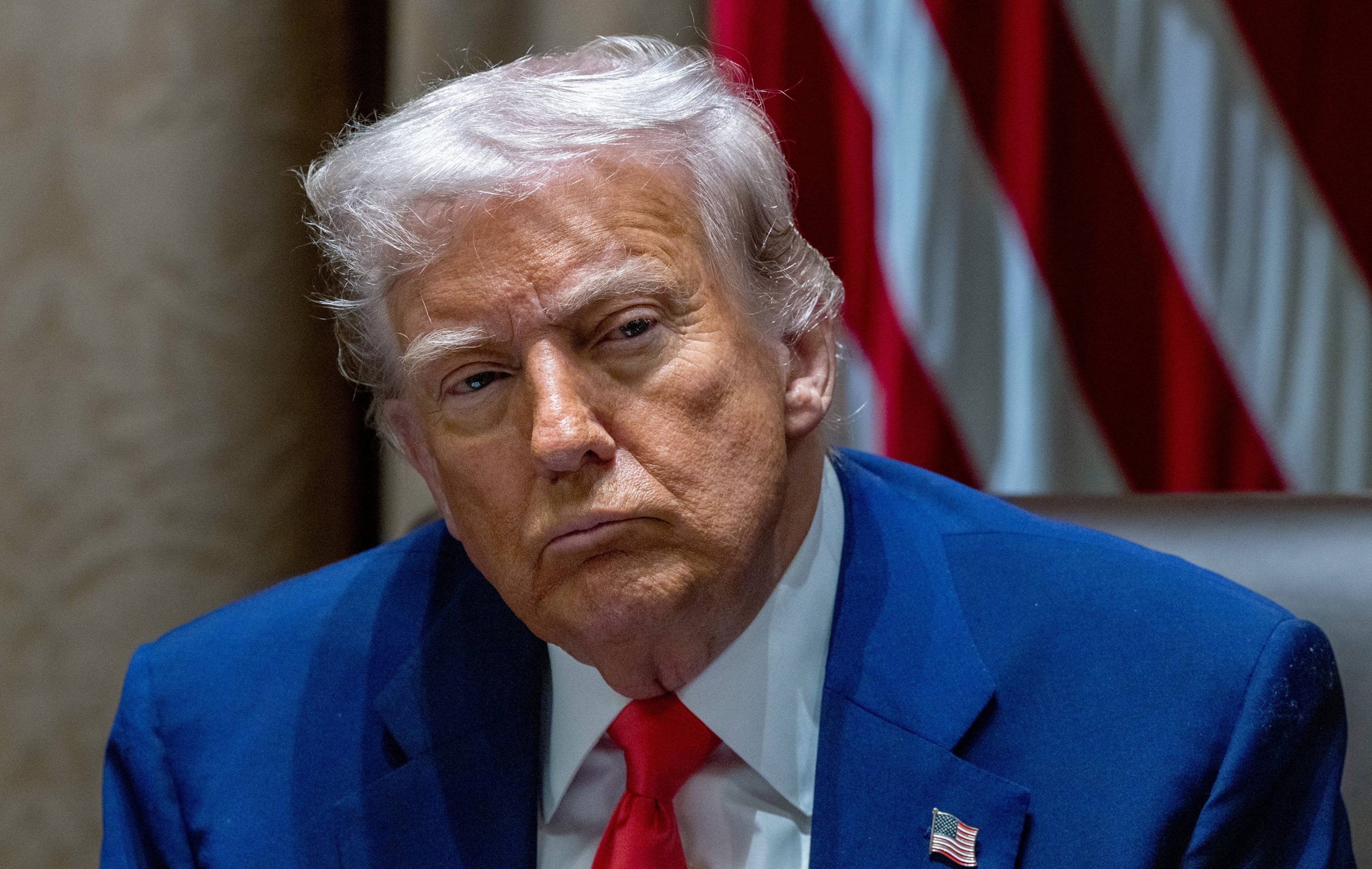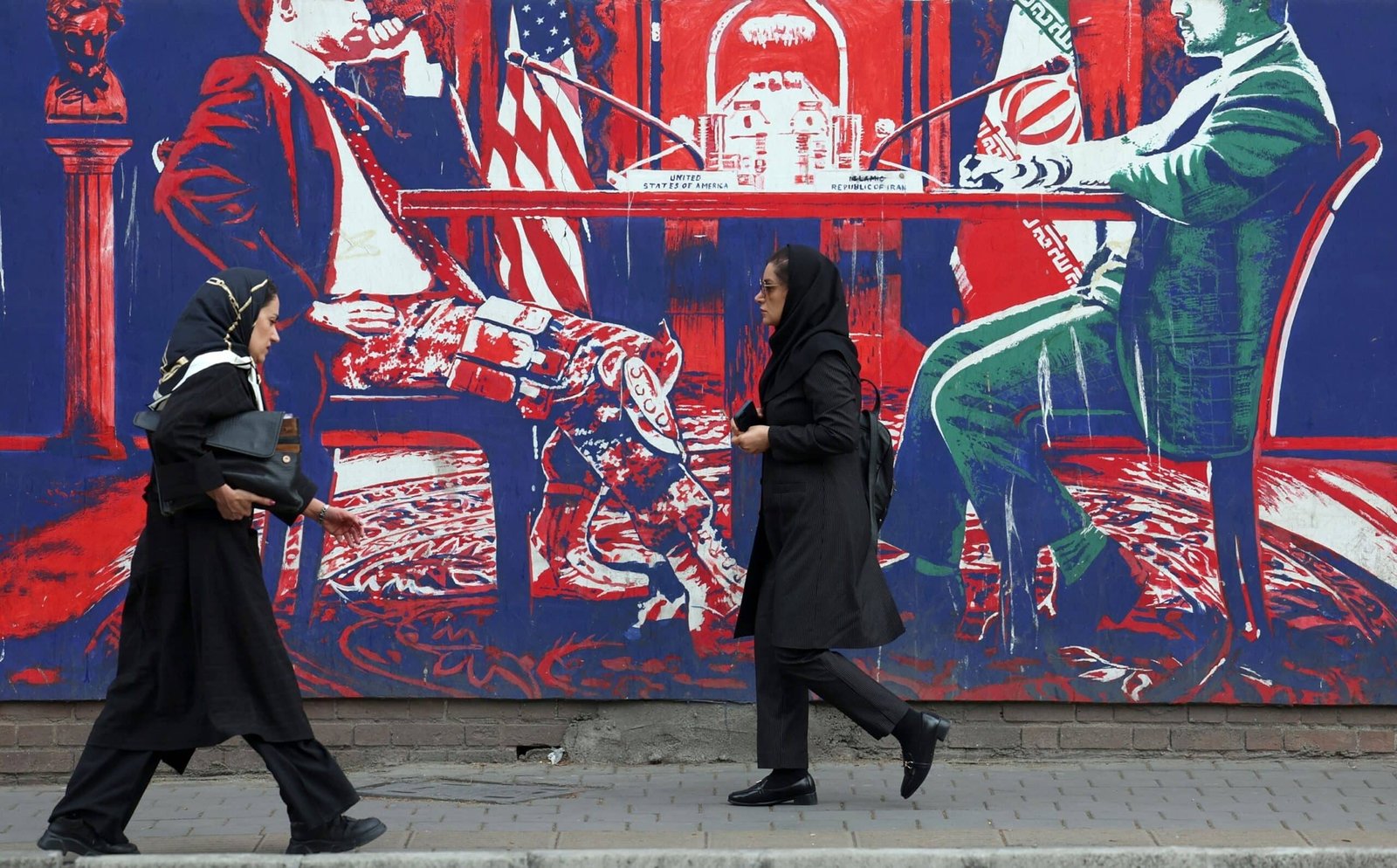The high -level delegations of the United States and Iran will meet during the weekend in Oman to discuss the nuclear program that Tehran advances, holding what the White House says they will be direct conversations for the first time in seven years.
The meeting occurs as experts are widely agreed that Iran’s breakup time to accumulate sufficient fistible material to produce a nuclear eye has decreased to only one or two weeks, and that Tehran could produce a diving weapon deliverable in less than a year.
Despite opening a line of communication with Iran, the Trump administration is playing Hardball, with the same president repeatedly makes clear last week that Iran’s alternative option to reach a military agreement was to attack, preparing the stage for a high -risk diplomatic confrontation.

The Iranians walk next to an united anti-state mural next to the former United States embassy in Tehran, Iran, on April 7, 2025.
Abedin Taherkenareh/EPA/Shuttersock
I disagree?
Before the scheduled meeting, both parties presented different ideas on how the conversations would occur.
From the moment that President Donald Trump made the surprise announcement that his administration would soon be involved with Iran during an Oval office meeting with the Israeli Prime Minister, Benjamin Netanyahu, on Monday, insisted that the two countries would not trust an intermediary.
“We are having direct conversations with Iran, and they have begun. It will go on Saturday,” Trump said. “We have a very big meeting and we’ll see what can happen.”
But Tehran officials quickly rejected that, with Iraní Foreign Minister Abbas Araghchi, said the meeting on April 12 would be “high -level indirect conversations.”
“It’s as an opportunity as a test,” he wrote in a social networks publication in X.

The White House Secretary, Karoline Leavitt, talks to journalists in the reports of James Brady Press at the White House, on April 11, 2025, in Washington.
Alex Brandon/AP
“Well, I have spoken with both the president and his national security team that will be dedicated to these discussions. These will be direct conversations with the Iranians,” the White House Secretary, Karoline Leavitt, retreated on Friday.
“The ultimate goal is to make sure Iran can never get a nuclear weapon. The president believes in diplomacy, direct conversations, talking directly in the same room to achieve that goal,” he continued.
If the White House vision is carried out, the conversations would mark the first time that the delegations of Iran and the United States have met face to face since 2018, when Trump left a nuclear agreement with Iran, the Comprehensive Comprehensive Action Plan (JCPOA), which was negotiated during the Obama administration.
New approaches, imminent deadlines
When it comes to obtaining information about the Trump administration strategy, the conversations format may not be as significant as the fact that conversations are scheduled to happen first.
Doreen Hornschig, member of the project on nuclear issues at the Center for Strategic and International Studies, and Bailey Schiff, program coordinator and program research assistant, argued the president’s approach Iran has progressed.
“Iran’s strategy of the Trump administration has evolved from a first -term approach focused on maximum economic pressure to a second -term strategy that combines diplomacy, military threats and sanctions,” they said, and added that the game plan is now based on “diplomatic dissemination, military position and sustained economic pressure.”

Iran’s Foreign Minister Abbas Araghchi attends a joint press conference with his Armenian counterpart after his conversations in Ereván, Armenia, on March 25, 2025.
Karen Minasyan/AFP through Getty Images
“What matters is that they are talking,” wrote Trita Parsi, executive vice president of the Institute of State Responsible for Quincy, in a Time de Op-E magazine for Time.
Parsi also argued that the moment is critical for Iran and the United States
“Despite its aggressive conversation and military posture, Trump cannot afford another important war in the Middle East,” he said. “For a long time he has been a candidate who promises to bring American troops home, not entangle them in a new war.”
Meanwhile, Parsi said that Iran faces a potentially worse economic perspective.
Already limited by extensive American sanctions, Tehran must also deal with the “Snapback” of the JCPOA, a kind of emergency brake integrated in the agreement that allows the United Nations sanctions to be re -imposed automatically if the terms of the agreement will be violated again.
European countries that are still part of the JCPOA until October 18 to trigger the Snapback function of the agreement and seem increasingly motivated to do so before the deadline.
But given the accelerated nuclear rupture timeline of Iran, the United States, and other countries that do not want to see a Tehran with nuclear capacity, they are also feeling a crunch.
From now on, there is no indications that the Iranian regime has given the orders to move on to the next level when it comes to developing a nuclear eye, but many US officials evaluate that it is under increasing pressure to do so of hard links due to the perceived threats for the safety of Iran and the broader disturbances through the Middle East.
Carrots and sticks
Despite the will to participate in the Trump administration and the economic pressure that push the Iranian regime, negotiators may have difficulty designing an agreement that can encourage all sides, according to former United States ambassador to Israel Daniel B. Shapiro, a partner distinguished with the medium -level security initiative of the Atlantic Council.
“If the conversations get serious, the two parties will face great gaps,” said Shapiro, former deputy secretary of Deputy Defense of the Middle East and main advisor to the State Department office of nearby matters of the Department of the East.

President Donald J. Trump listens to comments during a cabinet meeting at the White House in Washington, on April 10, 2025.
Shawn Thew/EPA-EFE/Shuttersock
Shapiro said Trump, as the administration Biden before him, seeks a stronger agreement than the JCPOA.
“Its objectives include completely dismantling Tehran’s nuclear program,” Shapiro said. “Based on all Iranian behavior in previous negotiations, there is no reason to believe that Tehran would agree with these terms.”
Even if Iran admitted it, Shapiro argued that Tehran would probably expect a massive relief of sanctions, it is unlikely that Congress signed.
Trump has indicated that if an agreement cannot be reached, the military action combined with Israel against Iran is the following option.
“If you require military, we will have military,” Trump said Wednesday. “Israel will obviously be very involved in that. They will be the leader of ESO.”
“He and his team surely know that in a relatively short time, the decision point on whether or not to continue a military strike is likely to face or not,” Shapiro said. “The moment, the need and the opportunity can never be more convincing.”





